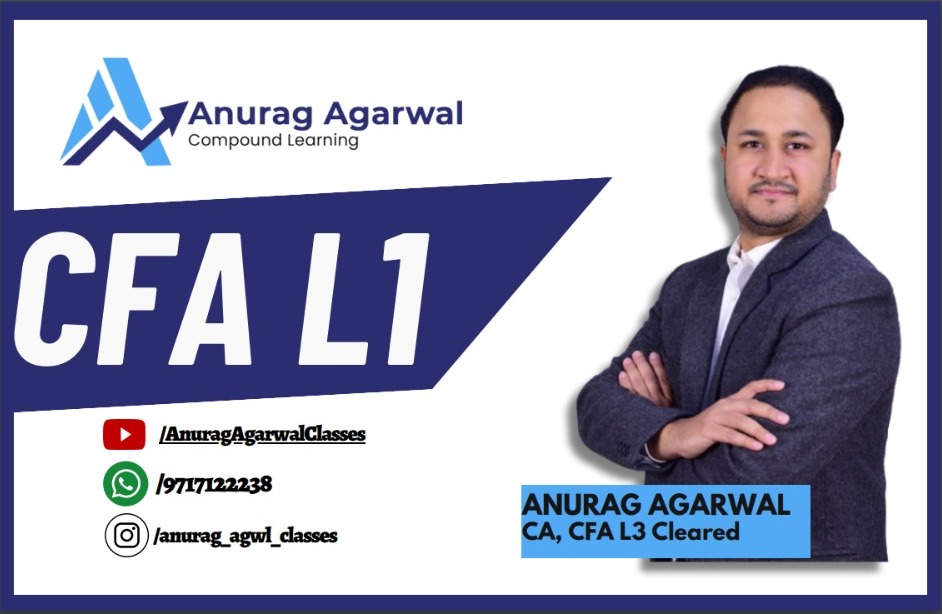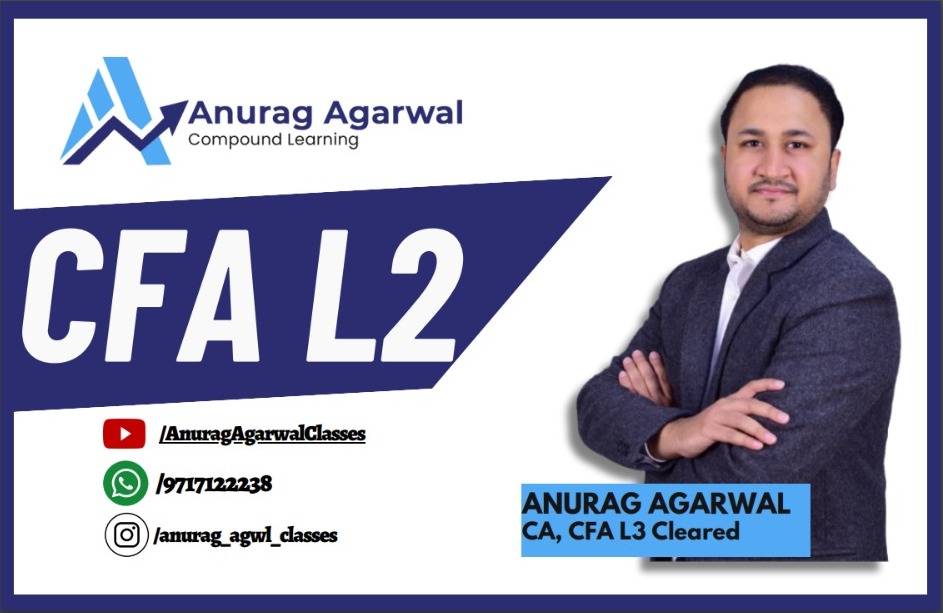CFA Exam Tips: Expert Strategies for Success at Anurag Agarwal Classes
The CFA (Chartered Financial Analyst) exam is one of the most prestigious and rigorous professional qualifications in the world of finance. Whether you’re just starting your CFA journey or preparing for the final level, the path to becoming a CFA charterholder can be both exciting and overwhelming. As you navigate through this challenging exam process, the right guidance and preparation can make all the difference.
At Anurag Agarwal Classes, we are dedicated to helping aspirants like you achieve their CFA dreams with effective study strategies and expert coaching. In this blog, we’ll share invaluable CFA exam tips that can help you excel, along with insights into how our classes can make your preparation journey smoother and more successful.
About Anurag Agarwal Classes
Anurag Agarwal Classes has been a leading provider of professional coaching for finance-related exams like CFA, CA, and FRM for years. Our experienced faculty, personalized study plans, and student-first approach have earned us a reputation for helping students reach their full potential. We focus on simplifying complex concepts, ensuring that you are not just memorizing material, but deeply understanding it. This approach gives you the confidence to tackle even the most difficult questions with ease.
Our CFA coaching is known for:
- Comprehensive Study Materials: Tailored to cover every aspect of the CFA syllabus.
- Experienced Faculty: Trainers who have extensive industry experience and a deep understanding of the CFA exam structure.
- Mock Tests and Practice Papers: Regular assessments to help you track your progress.
- Personalized Attention: We focus on individual progress to ensure every student succeeds.
Now, let’s dive into the most effective CFA exam tips to help you prepare and succeed.
CFA Exam Tips: Your Guide to Success
1. Understand the CFA Exam Structure
Before diving into your studies, it’s crucial to understand the structure of the CFA exam. The CFA program consists of three levels, each designed to test your knowledge, analytical skills, and ability to apply financial concepts in real-world scenarios.
- Level I: Focuses on basic knowledge and comprehension of investment tools.
- Level II: Tests your ability to apply knowledge in practical situations with an emphasis on asset valuation.
- Level III: Examines your ability to apply concepts in portfolio management and wealth planning.
Familiarizing yourself with the syllabus and the weightage of each topic is essential. This helps you allocate sufficient time to the subjects that require more attention.
2. Create a Realistic Study Plan
A study plan is one of the most important elements of CFA exam preparation. The CFA exam requires a significant time commitment, and without proper planning, it can be easy to feel overwhelmed.
Here are some CFA exam preparation tips for creating an effective study plan:
- Set a Timeline: Aim to complete your preparation at least 3-6 months before the exam date.
- Prioritize Subjects: Allocate more time to complex and weighted topics like Ethics, Financial Reporting, and Portfolio Management.
- Consistency is Key: Study consistently, ideally for 2-3 hours a day if possible, to avoid last-minute cramming.
- Include Breaks: Make sure to take breaks regularly to avoid burnout and retain information better.
Our instructors at Anurag Agarwal Classes will guide you in crafting a tailored study schedule that fits your needs and helps you stay on track.
3. Master the CFA Curriculum and Focus on Key Areas
The CFA Institute provides a detailed curriculum for each level of the exam. While it’s essential to go through every chapter, there are certain areas you should prioritize:
- Ethics and Professional Standards (Level I and III): This section is crucial, as it carries significant weight in all levels of the CFA exam. Many candidates struggle with the nuances of ethics questions, so it’s vital to understand the CFA Institute’s Code of Ethics and Standards of Professional Conduct inside and out.
- Financial Reporting and Analysis (Level I and II): This section tests your understanding of financial statements, accounting principles, and how to interpret financial reports.
- Quantitative Methods (Level I): A solid grasp of quantitative methods will help you solve problems related to financial analysis, risk management, and valuation.
- Portfolio Management (Level II and III): Given its prominence in later levels, investing time in understanding portfolio theory and management is crucial.
By focusing on these key areas, you can improve your chances of scoring higher in the exam. The detailed resources provided by Anurag Agarwal Classes will ensure that you master these topics.
4. Practice with Mock Tests and Past Papers
CFA exams are notoriously challenging, and practicing with mock tests and past exam papers is one of the best ways to prepare for the real test day.
- Simulate Exam Conditions: Take full-length practice exams under timed conditions to build endurance and get used to the exam's pressure.
- Review Mistakes: After taking practice tests, review the questions you got wrong. This will help you identify weak spots in your understanding and focus your study efforts accordingly.
At Anurag Agarwal Classes, we provide students with access to a vast bank of practice papers and mock exams designed to mirror the actual CFA exams.
5. Focus on Time Management
Time management is crucial during both your preparation and on exam day. The CFA exams are long and rigorous, and many candidates struggle to complete all questions in the allotted time.
Here are some tips to manage your time effectively:
- Track Time During Practice Tests: Make sure to monitor how much time you are spending on each section or question.
- Don’t Get Stuck: If you find a question difficult, skip it and return to it later. It’s better to answer easier questions first and then come back to challenging ones.
- Pace Yourself on Exam Day: Stick to a time allocation strategy for each section and keep an eye on the clock throughout the exam.
6. Revise Regularly
Revising regularly is just as important as studying new material. Don’t leave your revision to the last minute, as it can lead to anxiety and poor retention.
- Review Key Concepts: Go over formulas, key terms, and essential concepts multiple times before the exam.
- Use Flashcards: Create flashcards for formulas or definitions to help with quick revision.
7. Stay Healthy and Manage Stress
The CFA exam can be mentally taxing, so it’s essential to take care of your physical and mental health. Here’s how to stay on track:
- Get Enough Sleep: Don’t sacrifice sleep for extra study time; a well-rested mind absorbs information better.
- Eat Healthily and Stay Hydrated: Fuel your body with nutritious food and keep hydrated to maintain focus.
- Take Breaks: Step away from your books occasionally to relax and recharge.
Why Choose Anurag Agarwal Classes?
At Anurag Agarwal Classes, we understand that every student has unique needs and challenges. That’s why we offer personalized coaching that adapts to your learning style. Here’s why you should choose us for your CFA exam preparation:
- Expert Faculty: Learn from instructors who are CFA charterholders with extensive real-world experience.
- Proven Success Rates: Our students consistently pass their CFA exams with flying colors, thanks to our tailored coaching strategies.
- Comprehensive Resources: From interactive lessons to mock exams, we offer everything you need to succeed.
- Supportive Environment: Our team provides continuous support to ensure you stay on track and remain motivated throughout your preparation.
Frequently Asked Questions (FAQs)
Q1: How much time do I need to prepare for the CFA exam?
A1: The CFA Institute recommends that you dedicate at least 300 hours of study for each level of the exam. This includes reading the curriculum, taking practice exams, and revising key concepts.
Q2: What are the passing rates for the CFA exam?
A2: The passing rates for the CFA exam vary by level but typically range from 40% to 50%. Proper preparation is key to increasing your chances of passing.
Q3: Can I take the CFA exam while working full-time?
A3: Yes, many candidates successfully balance full-time jobs and CFA preparation. However, you’ll need strong time management skills and discipline to make it work.
Conclusion: Ready to Ace Your CFA Exam?
With the right preparation and guidance, passing the CFA exam is within your reach. By following these CFA exam tips and enrolling in Anurag Agarwal Classes, you’ll be well on your way to earning your CFA charter. Our expert instructors, comprehensive study materials, and personalized approach will help you navigate the complexities of the CFA syllabus and perform confidently on exam day.
Start your CFA journey today! Visit Anurag Agarwal Classes to learn more about our programs or contact us for a free consultation.
Available Courses

CFA L1
₹16000.00/-
CFA L2
₹17000.00/-.png)
Alternative Investments
₹2500.00/-.png)
Derivative
₹2200.00/-
CFA Partial L3 Topics Derivative
₹4000.00/-




